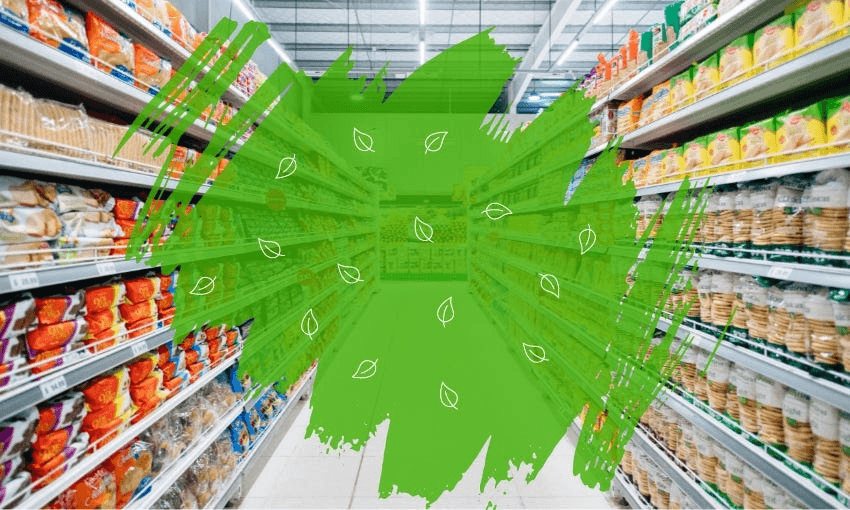While New Zealand is yet to even size up the scale of greenwashing, other parts of the world are forging ahead with new rules.
This is an excerpt from our weekly environmental newsletter Future Proof. Sign up here.
The loo paper in my shopping basket is “earth smart”. The cotton buds, “earth kind”. The packet of cinnamon is “eco”. Like many shoppers perusing the supermarket aisles, buying stuff that’s better for the planet is on my mind.
Sustainability is second only to price when it comes to choosing what to purchase, says Gemma Rasmussen, head of research and advocacy at non-profit Consumer NZ. Forty-four percent of us will switch to a greener-sounding brand – and pay a little extra – if we think it’s more sustainable.
But in many cases, we’re being tricked. The supermarket is an area “rife with greenwashing,” says Rasmussen, referring to the use of meaningless marketing terms and visual cues to persuade shoppers that a product is environmentally friendly.
In an audit, Consumer investigators filled a shopping basket with products and painstakingly scrutinised their green claims, with alarming results. For example, you might think that bin liners made with 50% “ocean plastic” would be made with rubbish collected from the sea. But the label actually refers to plastic picked up within 50km of the coast.
Rasmussen says the government must prioritise greenwashing and fund a comprehensive survey, so we can understand just how bad this problem is. Overseas, sweeps of supermarket shelves have found 40–50% of green claims are unclear or unsubstantiated. “We have suspicions that something similar is happening in New Zealand,” she says.
EU introduces greenwashing rules while NZ lags
While New Zealand is yet to even size up the scale of greenwashing, other jurisdictions are forging ahead with new rules. By 2026, an EU-wide ban on generic buzzwords like “eco” will come into force. Companies wanting to make claims about the sustainability credentials of their products will need to submit evidence to an approved certification scheme. “What that means is as a shopper, you are able to shop with confidence because you know that everything that ended up on shelves has been vetted,” says Rasmussen.
Rasmussen would like to see similar proactive legislation in New Zealand, because “it shouldn’t be the responsibility of the general public” to decipher vague green claims. “I’m really involved in greenwashing and I can’t tell what are genuinely sustainable products and what are not.”
Currently, the Commerce Commission provides environmental guidelines – which aren’t legally binding – and businesses must abide by the Fair Trading Act, which broadly says you can’t mislead or deceive people. But the system is broken, Rasmussen says, “We have a Commerce Commission that doesn’t have the capacity to prosecute, we have a government who’s not prioritising it. We also have businesses who are at a competitive disadvantage because they don’t engage in this.”
Taking on greenwashing in the High Court
Consumer NZ is taking their advocacy to the High Court, joining forces with Lawyers for Climate Action and the Environmental Law Initiative to take legal action against the second largest emitter in New Zealand, Z Energy. The case alleges that Z’s “Moving with the times” ad campaign constitutes “audacious” greenwashing. “We’re in the business of getting out of the petrol business,” the ads proclaim, highlighting cleaner energy initiatives. “It would be reasonable for any member of the public, who is looking at that campaign, to think that they’re talking about getting out of fuel sales,” says Rasmussen. “In reality, their fossil fuel sales and carbon emissions are increasing… We just think that level of major corporate greenwashing is not OK.” Z Energy filed their defence statement earlier this year.
Ultimately, there’s power in numbers, Rasmussen says, which is why Consumer NZ is calling for New Zealanders to sign on to their greenwashing campaign and submit examples of dodgy eco claims for investigation.
“We know it’s really hard to identify greenwashing. But if people are seeing things that they do think are quite sus, reach out to us because we are really happy to look into that.”

